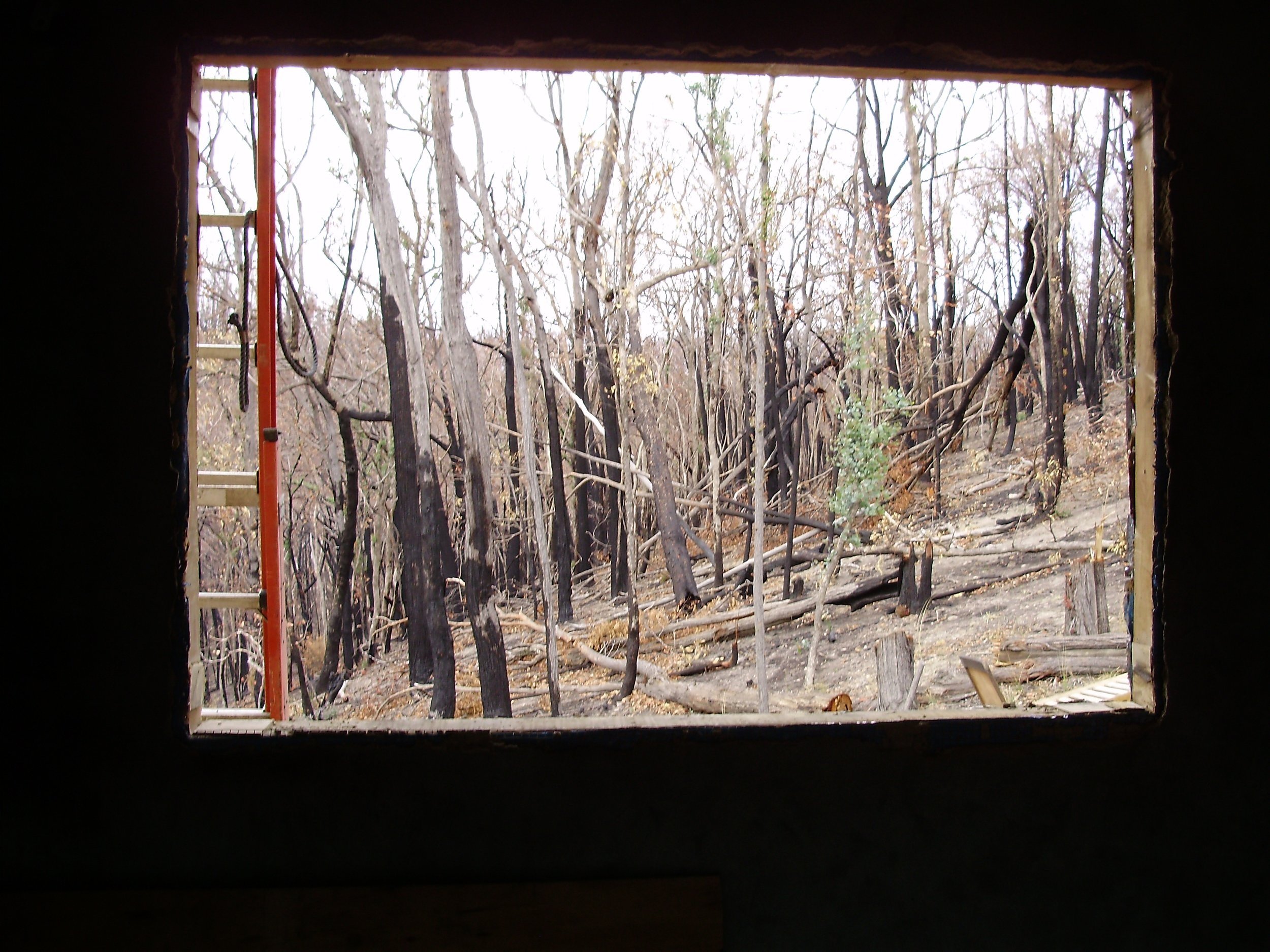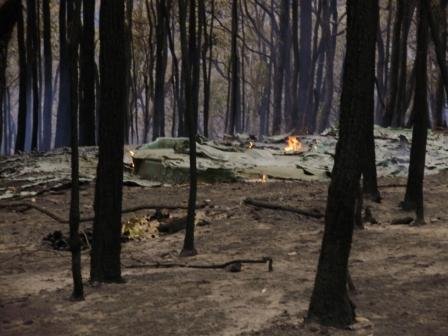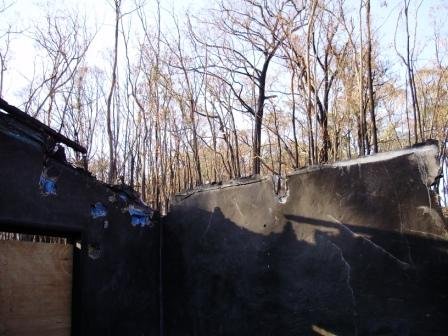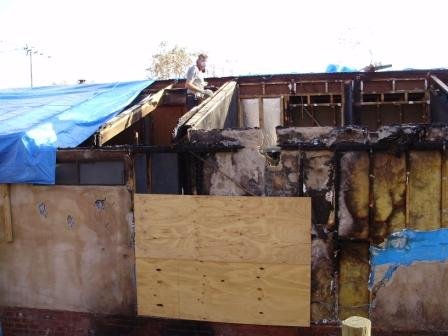
Survivor Guilt
Janet Meade
For the 173 who did not survive
“What’s your story?”
Ang was at home, defending, while Pete was out on the fire truck. She heard the roar of hell approaching. She doesn’t think she’d be here if the wind hadn’t changed.
Hazel was lucky. A friend just happened to be there to help her when the fire swept through Strathewen.
Me? I ran. I’m terrified of fire. I always have been. Even more now.
I’ve seen the faces of those who stayed to face the inferno.
Sunday night on the main road through Heathcote. We erupt from the Thai restaurant, laughing too loud, heading back to the B & B where our stay has been donated by the owners. Such kindness and generosity from the community to help us recover.
There is a children’s playground on the way, courtesy of the Lion’s Club. The whirligig fits all three of us and the world contracts to Ang and Hazel laughing, three feet away, while the world spins and tips and races past the tiny doorway. Until Hazel grabs the centrepiece to slow us to a stop and drags herself out into the chill night.
We had started drinking at lunchtime; three middle-aged young women getting away from it all. Trying to forget. Stuck with remembering as conversation contracts to what happened on that day, and what happened after, and we spin round again and again.
Nev was out on the truck with the fire crew, so the kids and I drive to Yarra Glen, my eldest trying to control her panic attacks. I wonder whether it is a good thing to do when we see the fire already on the other side of town.
We stay with Jo, helping her defend against ember attack, trying to stay calm as fire blocks all the roads out of town and we are surrounded by smoke and sirens.
At Sugarloaf Dam the police have to break up a disturbance. The gates had been locked, but people have congregated, trying to reach the safety of the dam wall. Some-one tries to break the chain with bolt-cutters.
They are all safe, but only because the wind changed.
In Yarra Glen I stand, horrified, with people from nearby houses, helpless to stop the car burning. The fire brigade is trying to put the fire out.
The car is on its roof, flames leaping, surrounding, consuming. How can metal burn like that?
It is only later we learned that Gareth had rushed to town to fetch fuel for his fire pump. When the car rolled the fuel must have spilt and fed the fire.
His was among the first of the funerals.
The fire did not reach his home.
My neighbour in Christmas Hills is sheltering in the studio with her husband and the dogs, where they thought they would be safe. When the only door catches fire, the dogs are too afraid. They will not come out from under the couch - the humans leap to safety through the flames.
Further south in Christmas Hills are Jenny and her husband and kids. Kylie lives up the hill from her. They both hear a sound like a freight train roaring towards them through the bush. Both fear they are not ready to withstand a fire.
Then the wind changed.
After the wind changed, the fire rages through Steele’s Creek. A friend’s nephew huddles in the corner of a house there, talking to his parents on his mobile phone.
Saying good-bye.
High winds and sirens. Standing in the township surrounded by the wailing of the wind and the fire engines, I look towards the hills near my home. When I see the flames coming over the ridge I know there is no reason to expect my home to survive.
Another family joins us at Jo’s, distraught, their car ruined by the drive through the flames on Steele’s Creek Road.
Our dog is chained in the yard, Jo’s dog is running in circles and there are cats in cages in the laundry. This is luxury, three families under one roof, compared to the people who found shelter at the supermarket.
But we are all alive.
My neighbour’s house was saved, but the studio and the dogs perished.
She tells me her story on Sunday morning. Trees still burn in places, but I have driven in past the fallen powerlines and smoking, devastated bush.
It is the first time I see it, that look beyond horror. So many faces wander through those weeks after the fire, flames and fear reflected in eyes that see still what they should not have.
I spend most of Sunday on the phone, reassuring friends and family. The phone call from Ang is brief. She is needed with the fire crews; her home is okay. I learn that Hazel is safe, although her property took some damage.
The first weeks after the fire, walking through the town of Yarra Glen is a surreal gauntlet. With fatalities still uncertain I see faces of people I barely know and we exchange nods, smiling with relief. Another person survived.
It isn’t possible to buy a loaf of bread without stopping to talk to someone, hearing the good and bad news. Are they okay? Was their home damaged?
The first day I return to work I drive through Yarra Glen, past the world’s friendliest school crossing lady. As she smiles and waves I return her greeting out of habit and then burst into tears.
I steady myself to keep driving, allowing the knot in my chest to ease and the tears of relief to pass. She’s okay!
Every person who survives is a blessing.
I return to work in Healesville the week after Black Saturday. I want to believe that life can be normal again.
Every time a siren screams past to fight the fires in the hills around town I find myself tensing, ready to flee, wondering where the fire is, whether it will come closer. For three weeks the town of Healesville stands poised to fight or flee.
Nev has taken time off work, patrolling the control lines in Christmas Hills as the fire flares up in one place or another. We live surrounded by smoke, obsessively hanging on the words of the weatherman. What way will the wind blow tomorrow?
Even now strong winds make me anxious.
I keep the newspapers afterwards, but it is a few weeks before I actually read them – see the stories of heroism and tragedy. I weep and I read, and finally I think, “I’ve faced it now. It’s over, then.” I was wrong.
I think I understand, a little, how it must feel to see your house burned to the ground.
It’s just wrong. There should be a house there, not a pile of rubble and twisted metal.
I stand in my partly burnt house and it’s like some kind of bad dream. Only dreams don’t smell like this – an acrid stench as glass rattles underfoot on the filthy, sodden carpet.
It’s my house, but the walls left unburnt are black. Everything is coated black, even “clean” dishes in the cupboards. Circles of clean, white melamine appear as the cups and glasses are taken out for washing.
Ang and Hazel are among the heroes in my kitchen, helping to achieve the task that overwhelms me.
When the blackened furniture has been taken out and the cupboards emptied of soot-stained belongings, it is somehow easier to stand in what used to be my home. When the roof is peeled away to repair the damage, I laugh at the sky and make jokes about needing a skylight.
There is no longer the semblance of corrupted normality that so offended me, panicked because my nest had been attacked.
I feel a guilty relief that I have not had to deal with death and grief. I am shamed by feeling pain at my own petty troubles.
The damage to our house was too extensive for us to be able to live there. For four months we live in a borrowed house, while we work our tails off to fix our home, repairing walls and roof, repainting every internal wall.
The day we move back home I watch the news as we share the evening meal. People from Marysville are finally able to move into temporary accommodation.
For four months there was an ache in my soul while I tried to ignore the voice crying in my mind – “I just want to go home.”
I weep for those who suffer still.
My case manager is explaining what further services are available to my family and myself. I am not comfortable with this process – I’ve tried to avoid this meeting.
We are the lucky ones. We are back in our home. We lost little of great value. We had stuff left after our house burned – we just had to clean the black shit off it.
I feel so bad. I have my own roof back, but others still suffer. I don’t deserve to be given any more.
They call this survivor guilt.
When I visit Hazel I see the tents and caravans that now house people in Strathewen. I think of the survivors living in tents in Kinglake.
Ang and I work together. There are groups of people dotted about Hazel’s property, rebuilding the fences. There is some green returning to her paddocks, but the surrounding hills are blackened by holocaust. The forest is gone.
“Is there much regrowth around your place?”
“A bit. It’s still mostly black when I look out the window. Some trees seem to be coming back better than others. The ones near the worm farm overflow are doing best. I think what the forest needs more than anything is rain,” I reply, straightening my back.
“I need to rest my hands. Your turn with the machine.”
“I don’t like fencing,” I complain, as I take the contraption from Ang.
“Oh, that’s all right,” replies Ang. “Next time we’re here, Hazel will have us planting trees . . . again.”
I laugh bitterly. “The last tree-planting was the hardest. I’m older every time and my back and legs just won’t take it any more. How many do you reckon we planted in those gullies?”
“Thousands!”
I groan. “Still, did you notice? Some are growing back.”
“Yeah. There’s not much regrowth on the road up to Kinglake, though.”
“I still haven’t been up that way. I don’t know if I want to see it.”
“It’s always been a bad road, but now it’s really scary.”
“I was talking to Pete the other day. He reckons even his dreams are all black. You two have been spending too much time out with the fire crews.”
“It has to be done.”
“Helluva year to decide to join the CFA.”
“I’m glad we did, though. They need every-one they can get. Pete says he saw Nev on the Christmas Hills truck last week.”
We both stand and stretch our backs. I reload the “stapler” and hand it to Ang. My turn to hold the wire in place.
“Have you noticed that whenever you talk to any-one, you always end up talking about the fires?”
“It’s a bit like that, isn’t it?”
“How’s Heather?”
Heather’s home in Kinglake had burnt to the ground. With her kids she had sought shelter at the primary school. The group of people that found themselves there saved the school and themselves and their children.
I am surrounded by heroes.
When morning comes in Heathcote, I find I am not badly hung over. I wake with relief – the pain in my chest that has been my companion for some months now, is gone. The vodka and the laughter have worked some magic that has eased my pain. I wish that Heather had been able to come.
And when the owner of the B & B asks if she may hear our stories, I hesitate.
I can’t tell my story. When I try to, I find myself telling other people’s stories. The fear, the near misses, the devastation: these things are part of what I have seen. I have seen those faces, frozen in terrified disbelief. Their pain haunts me.
I have walked in the blackened bush and cried for the animals and birds which are not there.
We have all lost.
This is not one person’s story. Our pain is shared. This fire has touched a whole community; it continues spinning through our lives.
But I try.
“ . . . By the time we’d finished cleaning up our place, we’d filled three skips. Panga up the road fit his whole house into one skip!”
As I try to put the feelings of a whole community into a few brief sentences, I remember the words of John Donne.
“No man is an island, entire of itself; every man is a piece of the continent, a part of the main; . . . any man's death diminishes me, because I am involved in mankind, and therefore never send to know for whom the bell tolls; it tolls for thee.”
There is no way to tell my story without someone else’s. We shared this experience, this disaster. And when the community rallied and took care of us afterwards we shared the feeling of hope. Something good had come out of the flames.
I find myself walking through Hall’s Gap with a friend who lives in the suburbs of Melbourne. We have come to the Grampians for a brief bushwalking break. In a shop there is a display of photos from the 2006 fires in the area.
Looking at the photos takes me back to Black Saturday and the weeks after. The raging flames remind me of the bush destroyed and animals wiped out. Burning houses make my chest tighten as I remember all the people who are still without their homes. When I feel sobs wailing up through my heart for the people who died I leave the display to collect myself.
Noticing my quick departure, my friend joins me.
“Yeah, I’m over it,” she says, gesturing towards the display.
“Yes,” I agree. But I’m not, I keep to myself, unable to explain the emotion; not wanting to ride the roundabout again.
Those of us who lived through this are not all healed. When we talk we go round in circles, still trying to deal with the past. Dreading next summer.
It isn’t over.
And the climate is kindling the rising winds . . .










